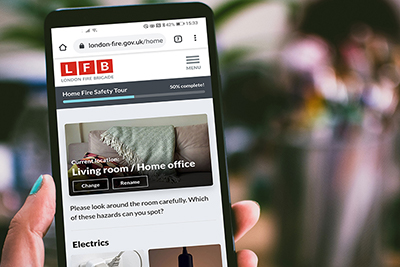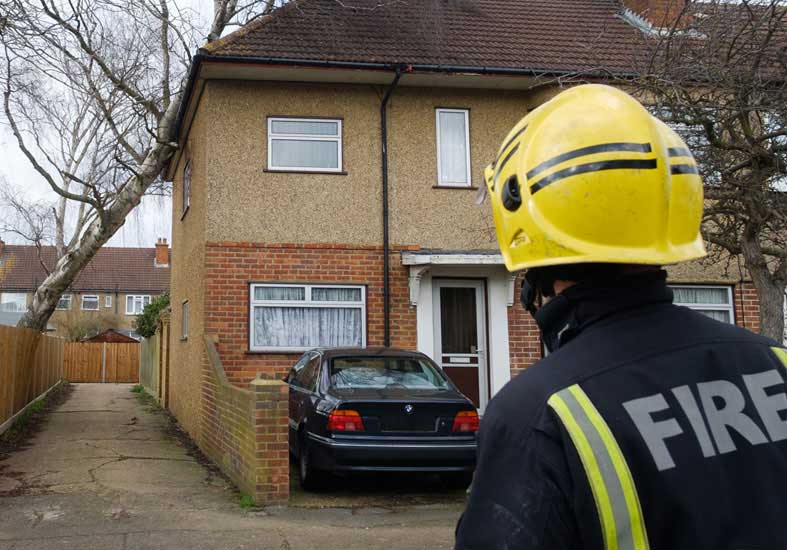Smoke alarms and heat alarms
Getting the right fire detection system
Did you know that smoke alarms alone aren't enough? Everyone also needs a heat alarm in the kitchen, and some people need extra support. If you – or a family member – has a condition that may prevent or delay escape if there is a fire, you may need a specialist alarm system and advice to consider what to do in the event of a fire.
We can help you find the right approach for your home with a Fire Safety Visit – we'll even fit free smoke alarms if yours aren't up to scratch yet!
Group Manager for Community Safety, Mark Hazelton, explains the essentials you need to know about smoke alarms and heat alarms.

Check your home's safe using our simple tool
It only takes a few minutes to check your home and get tailored advice for your family.
Why are smoke alarms so vital?
The early warning that saves lives
Most fires at home start accidentally – and the effects can be devastating. A fire detection system (that's smoke and heat alarms to most of us!) provides an early warning – and time to escape – that really does save lives.
Smoke alarm or heat alarm – what's the difference?
Smoke alarms detect smoke whereas heat alarms detect rapid increases in heat. Smoke alarms should be fitted in all rooms where a fire may start except for rooms where there may be an excess of smoke or steam (such as a kitchen).
Heat alarms go off when the room reaches a certain temperature and should be placed in the kitchen instead of a smoke alarm. Heat alarms are just as easy to fit as smoke alarms.
Smoke and fire alarm must-knows
- Don't just fit a smoke alarm in your hall and landing – also fit them in any room where a fire can start. For example, any room where you smoke or leave appliances plugged in.
- Smoke alarms are not suitable for kitchens but heat alarms are. Fitting a heat alarm in your kitchen will give you warning of an increase in temperature caused by a fire but will not be set off by cooking fumes.
- Some battery or mains alarms can be interlinked, so that when one alarm detects a fire they all go off together, giving you warning wherever you are in your home. This is particularly important where a person has any issues that may prevent or delay their escape to ensure they are alerted to a fire as soon as possible.
- If you choose to have a mains-powered alarm, make sure it's installed by a qualified electrician.
- It's also possible to fit extra automatic 'fire suppression' systems at home – that's things like sprinklers. These are a great idea if there's anything that might prevent you escaping quickly.
How to choose a smoke alarm
Setting up the right fire alarm system for you
A couple of hours – and not much money – is all you need to get an appropriate fire detection system in place. It's well worth spending the time, as an early warning really can save your life.
10 tips to get your fire alarm system sorted
- A single smoke alarm isn't enough.
- Consider everyone's needs – if there's any reason there might be a delay in noticing or escaping from a fire, seek extra help.
- Make sure any alarms you buy are marked with a current British Standards or European (CE) safety mark, which shows they are approved and safe.
- Fit smoke alarms on a ceiling (or high up on a wall, if the instructions state it is suitable for wall mounting).
- Make sure you fit an appropriate alarm in every room where there's a fire risk.
- Follow the instructions that come with the alarm when it comes to installation– they all work in different ways.
- Screw don't glue – if you use glue, it can seep into the alarm, and stop it working.
- Fit your smoke alarms away from kitchens or bathrooms as steam can damage the alarm, or set it off by mistake.
- Fit a heat alarm in the kitchen.
- Choose smoke alarms with a 10 year or long-lasting sealed battery.
Alarms for vulnerable people
Regular smoke and heat alarms aren't suitable for everyone, and not everyone can respond or escape quickly if there's a fire. However, there are different kinds of fire detection and prevention systems available to help keep everyone safe.
Fire detection for vulnerable people
Some people need extra attention because of their circumstances or lifestyle. There are three ways you can be vulnerable:
- Increased fire risk
- Less able to react
- Reduced ability to escape
Can we help – Home Fire Safety Visits
If you – or anyone you live with – is a vulnerable person, please get in touch and organise a free home fire safety visit. We can help you work out the right fire detection system for the circumstances, and help you get it installed.
Depending on what you or the vulnerable person needs, this might include:
- Smoke alarms, heat alarms and specialist alarms – like strobe lights and vibrating pad alarms for people with hearing impairments
- Linked alarms
- Monitored alarms connected to Telecare
- Personal fire protection systems
- Fire suppression systems
Though we don't fit all of these systems for you, we can put you in touch with the right experts to get what you need installed.

Not sure if your smoke alarms are safe?
A free home fire safety visit is a good way to get expert advice on fire detection, and learn ways to stay fire safe